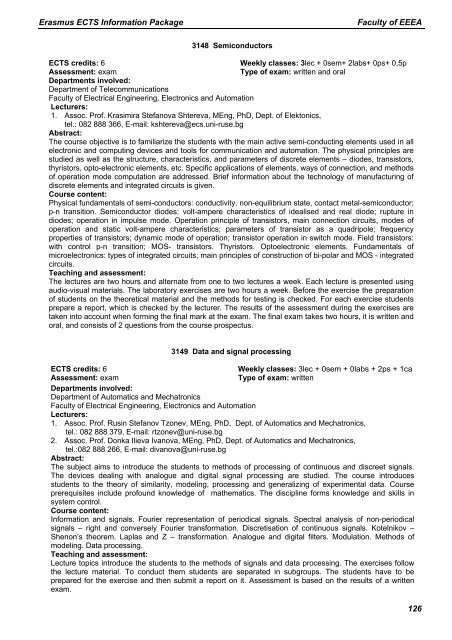Erasmus ECTS Information Package
Erasmus ECTS Information Package
Erasmus ECTS Information Package
Create successful ePaper yourself
Turn your PDF publications into a flip-book with our unique Google optimized e-Paper software.
<strong>Erasmus</strong> <strong>ECTS</strong> <strong>Information</strong> <strong>Package</strong><br />
Faculty of EEEA<br />
3148 Semiconductors<br />
<strong>ECTS</strong> credits: 6 Weekly classes: 3lec + 0sem+ 2labs+ 0ps+ 0,5p<br />
Assessment: exam<br />
Type of exam: written and oral<br />
Departments involved:<br />
Department of Telecommunications<br />
Faculty of Electrical Engineering, Electronics and Automation<br />
Lecturers:<br />
1. Assoc. Prof. Krasimira Stefanova Shtereva, MEng, PhD, Dept. of Elektonics,<br />
tel.: 082 888 366, E-mail: kshtereva@ecs.uni-ruse.bg<br />
Abstract:<br />
The course objective is to familiarize the students with the main active semi-conducting elements used in all<br />
electronic and computing devices and tools for communication and automation. The physical principles are<br />
studied as well as the structure, characteristics, and parameters of discrete elements – diodes, transistors,<br />
thyristors, opto-electronic elements, etc. Specific applications of elements, ways of connection, and methods<br />
of operation mode computation are addressed. Brief information about the technology of manufacturing of<br />
discrete elements and integrated circuits is given.<br />
Course content:<br />
Physical fundamentals of semi-conductors: conductivity, non-equilibrium state, contact metal-semiconductor;<br />
p-n transition. Semiconductor diodes: volt-ampere characteristics of idealised and real diode; rupture in<br />
diodes; operation in impulse mode. Operation principle of transistors, main connection circuits, modes of<br />
operation and static volt-ampere characteristics; parameters of transistor as a quadripole; frequency<br />
properties of transistors; dynamic mode of operation; transistor operation in switch mode. Field transistors:<br />
with control р-n transition; MOS- transistors. Thyristors. Optoelectronic elements. Fundamentals of<br />
microelectronics: types of integrated circuits; main principles of construction of bi-polar and МOS - integrated<br />
circuits.<br />
Teaching and assessment:<br />
The lectures are two hours and alternate from one to two lectures a week. Each lecture is presented using<br />
audio-visual materials. The laboratory exercises are two hours a week. Before the exercise the preparation<br />
of students on the theoretical material and the methods for testing is checked. For each exercise students<br />
prepare a report, which is checked by the lecturer. The results of the assessment during the exercises are<br />
taken into account when forming the final mark at the exam. The final exam takes two hours, it is written and<br />
oral, and consists of 2 questions from the course prospectus.<br />
3149 Data and signal processing<br />
<strong>ECTS</strong> credits: 6<br />
Weekly classes: 3lec + 0sem + 0labs + 2ps + 1ca<br />
Assessment: exam<br />
Type of exam: written<br />
Departments involved:<br />
Department of Automatics and Mechatronics<br />
Faculty of Electrical Engineering, Electronics and Automation<br />
Lecturers:<br />
1. Assoc. Prof. Rusin Stefanov Tzonev, MEng, PhD, Dept. of Automatics and Mechatronics,<br />
tel.: 082 888 379, E-mail: rtzonev@uni-ruse.bg<br />
2. Assoc. Prof. Donka Ilieva Ivanova, MEng, PhD, Dept. of Automatics and Mechatronics,<br />
tel.:082 888 266, E-mail: divanova@uni-ruse.bg<br />
Abstract:<br />
The subject aims to introduce the students to methods of processing of continuous and discreet signals.<br />
The devices dealing with analogue and digital signal processing are studied. The course introduces<br />
students to the theory of similarity, modeling, processing and generalizing of experimental data. Course<br />
prerequisites include profound knowledge of mathematics. The discipline forms knowledge and skills in<br />
system control.<br />
Course content:<br />
<strong>Information</strong> and signals. Fourier representation of periodical signals. Spectral analysis of non-periodical<br />
signals – right and conversely Fourier transformation. Discretisation of continuous signals. Kotelnikov –<br />
Shenon’s theorem. Laplas and Z – transformation. Analogue and digital filters. Modulation. Methods of<br />
modeling. Data processing.<br />
Teaching and assessment:<br />
Lecture topics introduce the students to the methods of signals and data processing. The exercises follow<br />
the lecture material. To conduct them students are separated in subgroups. The students have to be<br />
prepared for the exercise and then submit a report on it. Assessment is based on the results of a written<br />
exam.<br />
126
















